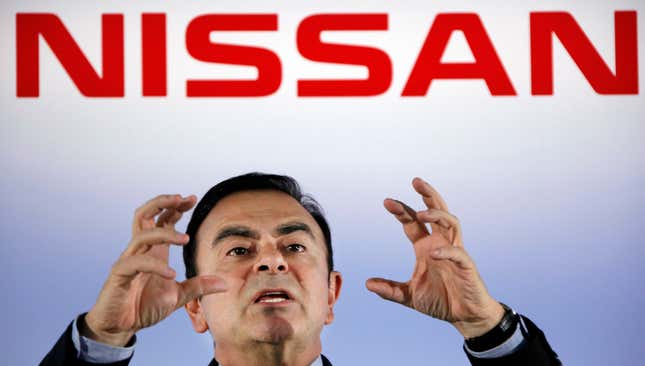
A very weird rumor floating around is saying that Carlos Ghosn, the former chairman and CEO of the Renault-Nissan Alliance, escaped Japanese house arrest and fled to Lebanon this past weekend by reportedly hiding in a musical instrument case ahead of a trial for his alleged financial misconduct.
Lionel Barber, the editor of the Financial Times—one of the outlets that first reported Ghosn’s escape yesterday afternoon—wrote on Twitter that “Beirut sources” say the executive hid in a box designed for a musical instrument to escape:
Yesterday afternoon, The Washington Post and Financial Times both reported that Ghosn had left Japan and taken a private jet to Lebanon on Sunday, but it was initially unclear whether the accused businessman had arranged something with the conditions of his bail and house arrest with Japanese authorities, or if he had fled the country.
We’re a bit skeptical of the piano case rumor as of right now, however, as we’re talking about Japan, a country with fairly strong passport controls, and it’s a wild coincidence that Ghosn escaped right before New Year’s Eve – a very convenient time to bury some less-than-desirable news.
A day after Ghosn was initially arrested back in November of 2018, the Lebanese Foreign Ministry released a statement backing the auto exec, claiming it would “stand by him in his adversity to ensure he gets a fair trial.” It looks like they may have given him a way out, instead.
In a press release following the initial reports of Ghosn’s travel, the former auto executive claimed he had “escaped injustice and political persecution,” via CNBC:
I am now in Lebanon and will no longer be held hostage by a rigged Japanese justice system where guilt is presumed, discrimination is rampant, and basic human rights are denied, in flagrant disregard of Japan’s legal obligations under international law and treaties it is bound to uphold,” Ghosn said in a statement.
“I have not fled justice — I have escaped injustice and political persecution. I can now finally communicate freely with the media, and look forward to starting next week,” he added.
That sounds like something somebody who actually “fled justice” might say, but I can’t say for sure as I have never had to smuggle myself out of Japan for doing money crimes (that you can prove!).
Also working in Ghosn’s favor is that Lebanon does not have an extradition treaty with Japan, as the Washington Post notes.
Ghosn’s lawyer, Junichiro Hironaka claims the sudden vacation was even a surprise to him, according to CNN, though fleeing house arrest from a country with a strict justice system—Japan’s conviction rate is around 99 percent—sounds like something you would check in with legal experts about before choosing where to go, if you’re smart enough to pick a place that won’t just kick you back out and feed you to your hunters.
Ghosn has citizenship in France, where he was CEO of Renault and the Nissan-Renault Alliance, Lebanon, where his family is from, and Brazil, where he was born.
He also came very close to being a permanent resident of Japan, after initially being held by Japanese authorities for 108 days. He was released in March 2019 after paying a bail sum of $9 million, but was then arrested again and posted another bail worth $5 million in April, totaling a record amount of $14 million. The conditions of his bail included close surveillance, seizing of his passports, and even forbid him from speaking to his wife.
If charged, Ghosn’s accusations of financial misconduct, including allegedly misreporting up to $80 million in differed compensation, could land him up to 15 years in prison. That is, if he ever ends up back where Japanese authorities can get to him.